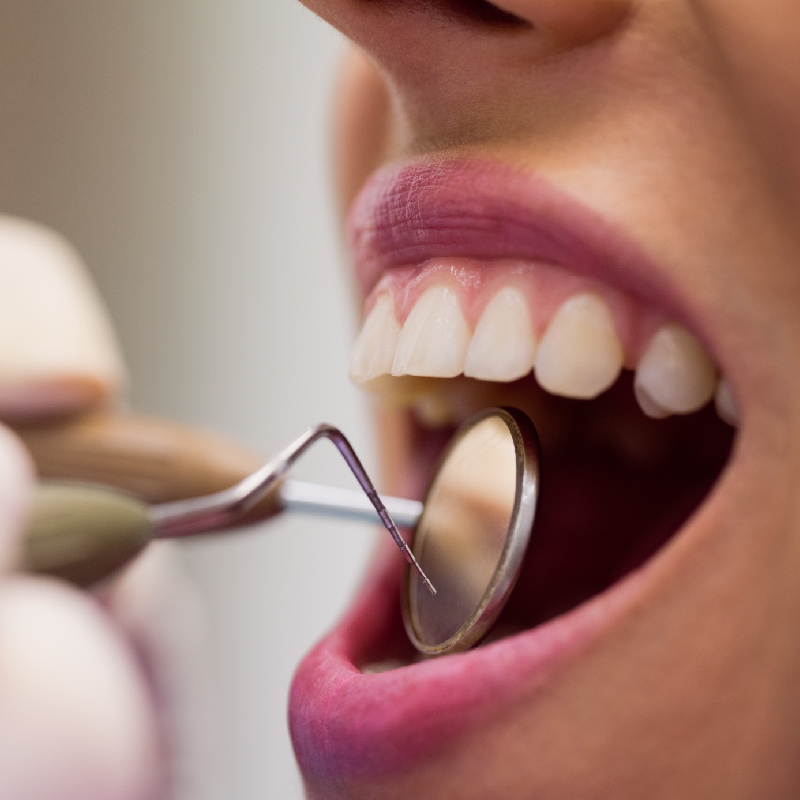General Dentistry
Cleanings
To maintain good oral health, regular checkups are vital. During these visits, our hygienist will clean your teeth extensively, polishing and rinsing to remove plaque. Your gums and teeth will be checked to detect early signs of gingivitis and periodontal disease. Your teeth will be inspected for cavities and tooth decay, and we will look for problems that may not be apparent to an untrained eye. There are three main types of dental cleanings: prophylaxis cleaning, scaling and root planing, and gross debridement. While they all accomplish essentially the same thing — cleaner teeth — they are performed differently and for different reasons.

Prophylaxis cleaning
A prophylaxis cleaning otherwise known as routine cleaning is performed on healthy patients who just need routine maintenance in order to ensure oral health. In many instances, a prophylaxis cleaning is performed by a dental hygienist, and it entails removing all the plaque from teeth, removing deeper, hardened plaque (calculus), and any stains that exist on the surface of the teeth. While prophylaxis may not be administered on severely damaged teeth, it is a great dental cleaning procedure to maintain already-healthy teeth, along with daily oral hygiene practices. Most dentists recommend a prophylaxis cleaning once every six months to ensure plaque has not begun to build up on the surface of the teeth and to clean off hardened plaque if it already has developed.
Scaling and root planing
Scaling and root planing, which is also referred to as deep cleaning, is typically only administered to patients at high risk of developing gum disease or patients who have already developed gum disease. If an excess of plaque begins to build up over time without being properly cleaned off, it can harden and turn into tartar or calculus and has the potential of causing gum disease and other serious oral health complications. When this occurs, scaling and root planing are needed to ensure that the hardened plaque is cleaned off. Scaling and root planing is most often performed on patients who have signs of gum disease, such as bleeding gums, swollen gums, or loose teeth.
Gross Debridement
A gross debridement is a dental cleaning procedure that is often administered by a dentist in order to determine if there are any teeth issues that were not initially noticed before the dental cleaning. A gross debridement is most often performed on patients who have not visited the dentist in more than a year or who have developed a build-up of hardened plaque on the surface of the teeth. Essentially, a gross debridement is performed by thoroughly working to remove any and all plaque buildup on the teeth and gums. While a simple gross debridement does not take long, debridements that are performed on damaged teeth with a large amount of plaque buildup may take a while to complete.

Dental exams and check-up
At a dental exam, your dentist or hygienist checks every tooth, and your gums, cheek and tongue. Healthy teeth thrive in a healthy mouth. Your dentist will check every structure and surface in your mouth for cavities, signs of gum disease, infections or other possible health issues.
General health checks
Your mouth might let us know there are serious health issues, like heart disease and diabetes, lurking just beneath the surface. Lesions, sores and other abnormalities in the mouth and throat could be signs of cancer or other serious diseases.
That’s why your dentist thoroughly checks your tongue, cheeks, tonsils and throat. If your dentist sees anything concerning, she’ll be sure to let you know. She might refer you to one of our specialists or your doctor. Should your dentist refer you to another medical professional for any reason, be sure to follow through. The sooner you can get help for your problem, the better the outcome tends to be. Don’t wait!
